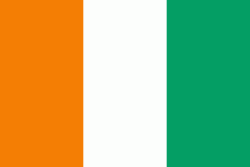Grand-Bassam
Grand-Bassam is a town in southeastern Ivory Coast, lying east of Abidjan. It is a sub-prefecture of and the seat of Grand-Bassam Department; it is also a commune. During the late 19th century, Grand-Bassam was briefly the French colonial capital of Ivory Coast. Because of its outstanding examples of colonial architecture and town-planning, and the juxtaposition of the colonial town with a traditional Nzema village, the historic center of Grand-Bassam was designated a UNESCO World Heritage Site in 2012.
In 2021, the population of the sub-prefecture of Grand-Bassam was 124,567.
The town is divided by the Ébrié Lagoon into two-halves: Ancien Bassam is the former French settlement, facing the Gulf of Guinea. It is home to the grander colonial buildings, some of which have been restored. The district is also home to a cathedral and the Ivory Coast National Museum of Costume, located in the former Governor's Palace. Nouveau Bassam, linked to Ancien Bassam by a bridge, lies on the inland, northern side of the lagoon. It grew from the African servants' quarters and is now the main commercial centre of the town.
The town is the seat of the Roman Catholic Diocese of Grand-Bassam. The diocese's cathedral is the Cathédrale Sacré Cœur in Grand-Bassam.
In 2021, the population of the sub-prefecture of Grand-Bassam was 124,567.
The town is divided by the Ébrié Lagoon into two-halves: Ancien Bassam is the former French settlement, facing the Gulf of Guinea. It is home to the grander colonial buildings, some of which have been restored. The district is also home to a cathedral and the Ivory Coast National Museum of Costume, located in the former Governor's Palace. Nouveau Bassam, linked to Ancien Bassam by a bridge, lies on the inland, northern side of the lagoon. It grew from the African servants' quarters and is now the main commercial centre of the town.
The town is the seat of the Roman Catholic Diocese of Grand-Bassam. The diocese's cathedral is the Cathédrale Sacré Cœur in Grand-Bassam.
Map - Grand-Bassam
Map
Country - Côte_d'Ivoire
 |
 |
| Flag of Ivory Coast | |
Before its colonization by Europeans, Ivory Coast was home to several states, including Gyaaman, the Kong Empire, and Baoulé. The area became a protectorate of France in 1843 and was consolidated as a French colony in 1893 amid the European Scramble for Africa. It achieved independence in 1960, led by Félix Houphouët-Boigny, who ruled the country until 1993. Relatively stable by regional standards, Ivory Coast established close political-economic ties with its West African neighbours while maintaining close relations with the West, especially France. Its stability was diminished by a coup d'état in 1999, then two civil wars—first between 2002 and 2007 and again during 2010–2011. It adopted a new constitution in 2016.
Currency / Language
| ISO | Currency | Symbol | Significant figures |
|---|---|---|---|
| XOF | West African CFA franc | Fr | 0 |
| ISO | Language |
|---|---|
| FR | French language |















